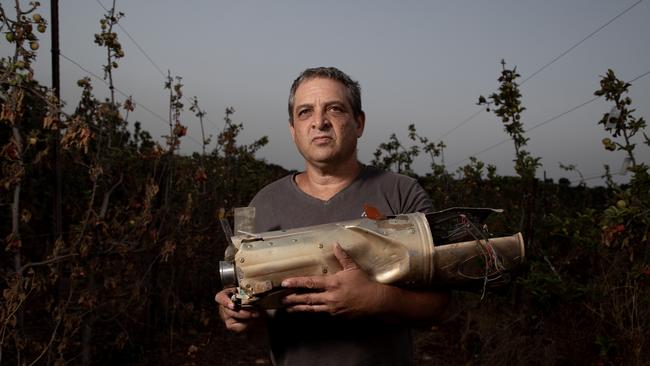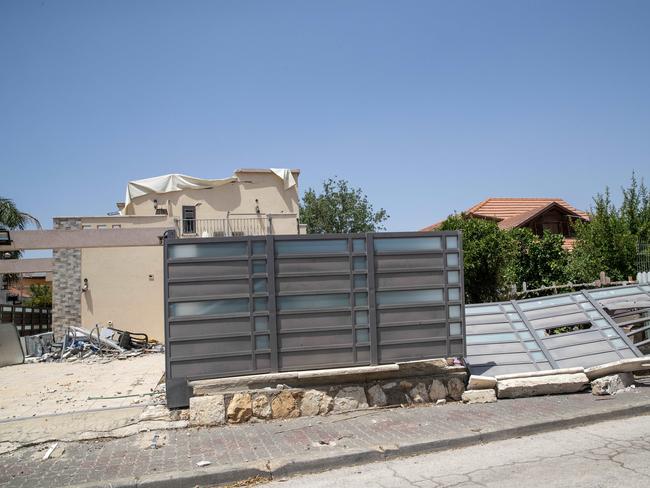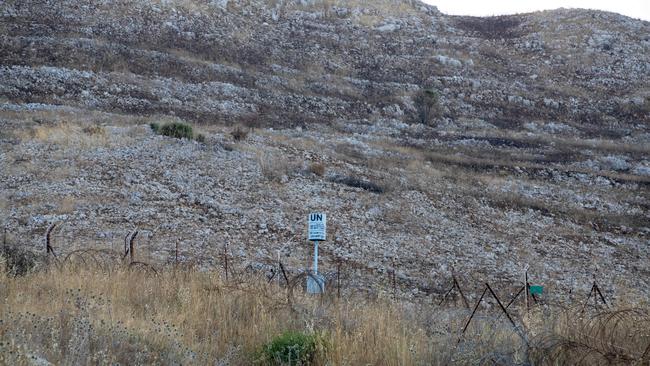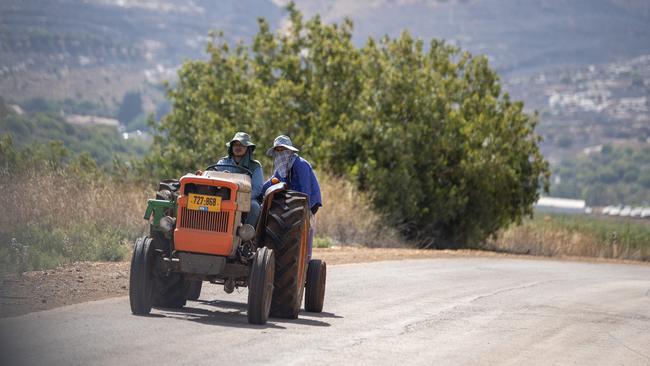Making hay while the rockets fly
Northern Israel’s farmers work the land as they face almost daily fire from Hezbollah amid fear the conflict will escalate to all-out war.

Shay Golany picks up the engine of a downed Russian missile fired by Hezbollah that landed in his cherry orchard, one of the hundreds that – so far, at least – have missed his house. Before Hamas’s terror attack on Israel last year the kibbutznik was living in peace with his wife and three children on the border with Lebanon.
“This land was very quiet, very silent,” he says. “I can’t say there wasn’t tension in the air but the atmosphere here was very, very peaceful.”
But now, almost every day, the farmer is ducking for cover from missiles, drones and rockets sent over from Lebanon into Israel as he tends to his lush fields of apricots, apples, cherries, kiwifruit and grapes. Often, a rocket heading farther south intercepted by the Iron Dome will land in one of his fields. Some have been targeted at homes at his kibbutz and left substantial damage.
“It’s all turned to an atmosphere that is very violent,” Golany says. “You see the fire, you see the rockets, you see the missiles. We are in a totally different world.”
It is early July and despite it being just one day after militant group Hezbollah – which many see as a proxy of Iran – fired 200 rockets over the border into Israel in retaliation for Israel’s assassination of a senior commander, the 54-year-old farmer is quietly defiant when he meets Inquirer on the Israel-Lebanon border.
He is now used to the almost daily exchange of fire from across the border that has intensified since early last month, usually tit-for-tat. There is a real fear across the Middle East, and Israel specifically, that the conflict will escalate into an all-out war.
While most of the world’s focus on the conflict in the region has been on the Israel Defence Forces’ destruction in Gaza, to the north in Israel about 80,000 people have been displaced and in Lebanon’s south there have been almost 100,000. Many Israelis are now living in hotels or with families and friends across the country.
The stakes are high, the tension palpable. Hezbollah has said it won’t stop firing rockets at Israel until there’s a ceasefire in Gaza. If an outright war were to break out, it quite possibly could be one of the biggest conflicts the Middle East has experienced in decades.

A burning smell pierces the air during the drive to Malkia. Spot fires still dot the countryside and greenery has turned ash-grey from the fires started by shrapnel from the missiles shot down. Military personnel are really the only people in the streets, and tanks are hidden under camouflage nets on the side of mountains as soldiers quietly wait for orders.
Malkia is a tiny village, population 600, now deserted, with only 20 or so farmers remaining. Lebanon is metres away, with farmers’ fields side-by-side across the UN Blue Line, formally divided by layers of razor wire and fencing. International workers, mostly Thais, drive tractors and buggies along the countryside from cropland to cropland, and to and from their accommodation, and are credited with keeping the evacuated kibbutzes running.
Inside the kibbutz, a playground sits completely empty while every street is eerily silent. When we meet Golany, he has just returned from putting out a fire caused by a downed missile. It’s a new job he has had to do almost daily. Farther south, the fire brigade tends to these, often throughout the night, as fire encroaches on a city. Golany says the firefighters have evacuated from his kibbutz. As he drives around the village, he points out his friend’s house. One has been hit by a missile.

What does he miss most? Going jogging with his 16-year-old son. “Now it’s very difficult to do it and now my family is not here, but we are trying to have some routine here, but the routine includes bombing and fires,” he says.
He is adamant an agreement will be reached and they’ll return to the life they had before October 7 last year.
“We need to live together; they have their land, we have our own land. We can’t fight forever. There is not border conflict, it’s a religious conflict,” Golany says.
Eitan Oren, who works with Golany, is equally adamant the conflict won’t escalate beyond tit-for-tat. “If you’re asking me, we will keep on slapping each other, higher flames, a lot of flames, but still it is going to be under control. It’s not going to be total war, it’s not going to happen,” he says.
“The Iranians don’t have nuclear weapons yet, and that’s the only reason.
“We can smash Hezbollah and unfortunately we will smash Lebanon with it, and I have nothing against the Lebanese – most Lebanese are amazing people.”

In places such as Jerusalem and Tel Aviv, where most people live a relatively ordinary life, most people Inquirer speaks to say they believe it is just a matter of time before an all-out conflict begins. At the end of last month, Iran threatened that if Israel escalated the situation, “a war of extermination will begin”.
“Should it embark on full-scale military aggression, an obliterating war will ensue,” the Iranian mission to the UN said. “All options, including the full involvement of all Resistance Fronts, are on the table.”
Despite the constant danger, Oren says he is urging anyone without small children to return to the kibbutz. “It’s not nice to see such a beautiful place so deserted,” he says. “We will do everything we can to maintain this place and make it radiant and beautiful, waiting for the people to come back home. I miss the sounds of little kids here.”
He’s collecting missiles for the next generation to show the world what he is facing. “I keep it to show the whole world that they were aiming these vicious weapons made by Russia and Iran,” he says.
“Soldiers against soldiers, that’s fine with me, but aiming it on private homes of people … we don’t do this on you guys, we don’t attack farmers on your side and civilians, not on purpose.”
It’s an ironic statement considering the UN says 35,000 people have been killed in Gaza and Israeli Prime Minister Benjamin Netanyahu recently has said 16,000 civilians have been killed in the Gaza war. To that, Oren says: “I won’t wish for you to watch your daughter being raped, her breast will be cut off after that and shot and dragged in Gaza, so I have zero mercy for them,” he says. “They did it biblical style.
“If we fall in here, they will not knock on your door, they will break it. Not all Muslims now though, I’m not putting them all together.

“They’re hiding among the civilians … I don’t want to hear ‘find the bad guys in tunnels but avoid hitting (civilians)’,” he says.
“Just hunt down this (leader of Hamas in Gaza Yahya) Sinwar and all these rats hiding in the rat holes and tell us where all those who’ve been kidnapped (are) and it’s all been stopped right away. Israel is the only country in the world that always needs to justify its existence.”
Just 20 minutes’ drive north along the border in the town of Kiryat Shmona, Inquirer witnesses an IDF fighter jet ripping through the sky, racing to intercept several missiles that have crossed from Lebanon into the Mount Dov and Dafna regions.
Most of the population, usually 24,000 people, have had to evacuate. Only a few defiant residents remain, well aware of the consequences if the government finds out. Loud explosions rip through the city and a smoke trail leads to a barren field far in the distance. For the few people who are around, they don’t seem to take any notice. Only when a missile is headed over the city do locals rush for cover. They have just seconds to do so.

According to the Alma Research and Education Centre, an Israeli organisation that researches the security challenges in the northern region, there have been almost 2300 attacks consisting of anti-tank missiles, high-trajectory fire, drones and anti-aircraft guns since October 8 last year, when Hezbollah fired the first shot. Some attacks have included dozens of missiles.
The research centre says Hezbollah has a weapons arsenal of 150,000 mortars and 65,000 rockets with a range of up to 80km, and 5000 rockets and missiles with a range of 80km to 200km. It says it believes the militant group has a further 5000 missiles with a range of 200km to 700km and 2500 unmanned aerial vehicles.
Alma founder and president Sarit Zehavi says there are fears of a repeat of the October 7 attack in the north from an elite fighting unit of “a few thousand” within Hezbollah, the al-Hajj Radwan Force, with the mission to invade Israel. “Hezbollah published that, it’s not a secret,” Zehavi says.
“They’re well trained, they’re well equipped and well experienced because they trained in the civil war in Syria against the rebels … but the IDF has attacked and damaged Radwan’s capabilities, that’s the good news here.
“We don’t think Hezbollah has the motivation to carry out an invasion at the moment.”
Back at Malkia, on the outskirts a group of tired soldiers is waiting to be stood down from duties. The eldest is 22; the youngest, still serving his three years of compulsory military service, is just 19.
Golany is well aware that in a few years his son may be in that position. “We are Jewish people, we know how to fall and come up on our leg and we will stand and fight because it is our country. We can’t give up on it.”





To join the conversation, please log in. Don't have an account? Register
Join the conversation, you are commenting as Logout